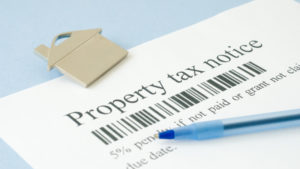
By emilie zhang @ Shutterstock.com
If you own real estate, you know that property taxes seem to rise continuously. Undoubtedly you have questioned if yours could be reduced. Fidelity has posted a guide that could help you lower yours. Sandra Block writes:
Home values have risen across the country, which means many homeowners’ property taxes are going up, too. The average annual property tax for owner-occupied single family homes nationwide in 2017 was $3,399, an effective tax rate of 1.17%, according to Attom Data Solutions.
Nine counties impose average annual property taxes of $10,000 or more. In Westchester County, New York, the average property tax is more than $17,000 a year. Now that federal deductions for state and local taxes are capped at $10,000, living in a high-tax jurisdiction has become even more expensive.
If your property tax bill has increased significantly, you may have grounds for an appeal, particularly if the increase seems out of line with overall appreciation in your area.
Most jurisdictions give you 90 days after you receive a new assessment to appeal, although some close the appeals window after 30 days, says Pete Sepp, president of the National Taxpayers Union. Some lawyers handle property tax appeals on a contingency basis, but most homeowners can appeal on their own, Sepp says.Plenty of property owners challenge their assessments each year, and between 20% and 40% of them win lower assessments and lower property tax bills. The following steps will show you the way to success.
Here are the eight steps to take in your fight for lower property taxes:
- Know the rules
- Catch a break
- Set the record straight
- Size up the neighbors
- Build your case
- Fight city hall
- Enlist troops
- Reap the rewards
Read more about each one here.
